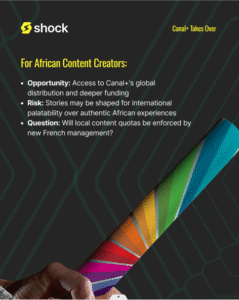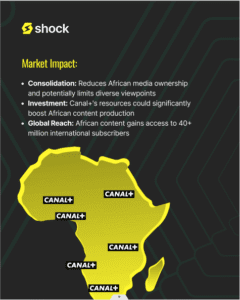The Story ⚡
Canal+’s mandatory takeover of MultiChoice Group became unconditional on September 19, 2025, shifting control of Africa’s largest pay-TV empire from Johannesburg to Paris, creating a pay-TV powerhouse with over 40 million subscribers that raises critical questions about African media ownership and storytelling control.
Tell Me More
The September 2025 acquisition represents one of the most significant media ownership shifts in African history. Canal+ now directly controls 46% of MultiChoice shares with an additional 2.2% tendered, effectively commanding Africa’s dominant pay-TV platform serving over 17 million subscribers across the continent.
The deal structure involves a share price of ZAR125 million (US$7.22m) per share, with the acquisition deadline for remaining shares set for October 17, 2025. The combined entity will serve 40+ million subscribers across 70 countries with a global workforce of approximately 17,000 employees across Africa, Europe, and Asia. As part of strategic commitments, MultiChoice Ltd will be carved out as an independent company majority-owned by historically disadvantaged persons (HDPs).
The acquisition creates a three-continent media giant with unprecedented reach, positioning Canal+ as a major competitor to global streaming services while fundamentally altering Africa’s media landscape power dynamics.
Leadership Revolution

The takeover triggered sweeping management changes, with French executives assuming control of Africa’s media operations. Maxime Saada, former Canal+ CEO, now serves as Executive Chair of Canal+ Africa, while David Mignot, former Canal+ Africa Director-General, becomes the new CEO. Nicolas Dandoy takes the CFO position, having previously served as Canal+ International CFO, and Jacques du Puy joins as Executive Director from his role as Canal+ International President.
Major departures from MultiChoice include Calvo Mawela, the former CEO who now serves as Canal+ Africa Chair, Tim Jacobs, former CFO who remains in a senior finance role, Christine Sabwa, former COO, Fatai Sanusi, Independent Non-Executive Director, and Andrea Zappia, Non-Executive Director and Showmax Chair.
Five independent non-executive directors remain to provide continuity, but strategic decision-making has shifted decisively from African to European leadership.
Strategic Commitments & Market Protections

Canal+ has made specific pledges to address concerns about foreign control of African media. The company commits to supporting historically disadvantaged persons (HDPs) in media ownership and backing small and medium enterprises in the audiovisual industry. They promise maintained funding commitments for local entertainment and sports content, continued support for South African content creators, and majority independent directors on governing boards.
The integration timeline includes the final share acquisition deadline of October 17, 2025, detailed integration plans and synergy strategies to be unveiled in Q1 2026, and immediate implementation of the integration process.
The company promises enhanced investment in creative and sporting content while leveraging Studiocanal for in-house production and expanding global platform capabilities.
Impact on African TV

The Canal+ takeover fundamentally reshapes Africa’s television and media landscape with far-reaching implications. Africa’s largest pay-TV platform is now controlled from Paris, potentially shifting key decisions away from local markets, while Canal+’s global resources could dramatically increase funding for African content production. Access to advanced streaming and mobile technologies may accelerate Africa’s digital TV transition, and African content gains potential access to Canal+’s 40+ million international subscriber base.
The transformation creates new opportunities and challenges for content creators. Deeper financial resources could mean significantly more commissions for African creators, and local stories may achieve unprecedented global distribution through Canal+’s European and Asian networks. However, potential conflicts may arise between authentic African storytelling and international commercial demands, with critical content decisions possibly migrating from African executives to French corporate leadership.
Questions around cultural and narrative control emerge from this shift. Who ultimately controls African storytelling – local voices or international shareholders?
Content may be shaped for global palatability rather than genuine African experiences, with potential prioritization of English/French over indigenous African languages. African stories must now satisfy both local audiences and European parent company expectations.
The long-term industry implications include reduced African media ownership diversity and potentially limited varied viewpoints, though it could create stronger international career paths for African creatives. European compliance requirements may reshape African content creation processes, while faster streaming adoption could benefit urban audiences while potentially marginalizing rural communities.
Critical questions remain unanswered: Will authentic African voices survive under French corporate oversight? How will local content quotas be monitored and enforced? Can African creators actually access promised increased investment?
Will editorial decisions prioritize African audiences or global market considerations?
In Summary
Canal+’s control of Africa’s media empire creates unprecedented opportunities for content investment and global reach, but raises fundamental questions about whether African storytelling can maintain its authenticity and independence under European corporate leadership in an increasingly consolidated media landscape.

Thanks for Reading.
Shockng.com covers the big creators and players in the African film/TV industry and how they do business.
Let’s be friends on Instagram @Shockafrica




